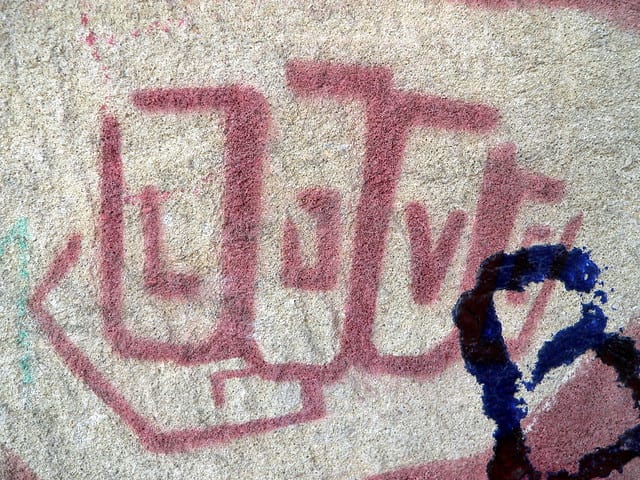
As we enter more deeply into this season which inspires us to love well, I am excited to share with you a new TED talk I recently watched.
Although we may think about love only in the context of our personal lives, in this talk Matt Tenney talks about why great leaders make love their top priority.
Matt’s talk is only 9 minutes long, and this such an important topic, so I asked Matt a few questions to help us explore his ideas in more depth.
Watch the TED talk, and I think you will appreciate our interview as well.
Matt, in your TED talk you mentioned that over the last 17 years you have been on a journey from prisoner, to monk, to social entrepreneur. Would you please tell us a little more about your journey?
Sure. About one year into my time in confinement I started practicing mindfulness.
Within six months of beginning my practice, I was happier in prison, with nothing, then I had ever been in my life.
This inspired me to go as deep as I could with the practice. Since I had been learning principally from reading books written by monks, I decided to transform the prison into a monastery and spent the next three and one-half years or so training as a novice monk.
The heart of monastic practice, as I understand it, is to make love the top priority, cultivating one’s own ability to be at peace and love unconditionally so one could thereby help others be happier.
After being released from confinement I went to train in a real monastery for a brief time with the intention of being ordained for the rest of my life, but ultimately decided I should continue to live as close to the monastic way as possible out in the real world.
Because I had such a deep desire to be of service, I have been a social entrepreneur ever since.
What insights did you gain in prison which prepared you to take your next steps?
My most important insight occurred a little over two years into my time in confinement.
I had been practicing mindfulness very intensively in a solitary setting. During a period of practicing mindfulness while sitting still, the ego suddenly dissolved entirely.
I had a very deep insight into the truth that while on some levels we are clearly all separate people, the deeper truth is that we are so interconnected it is ultimately impossible to see any real separation between us.
It became so clear to my why love is the universal truth: Your well-being and my well-being are so deeply interconnected, they’re essentially the same thing. Helping you is actually the best thing I can do to help myself.
Having seen this very deeply, it also became clear that there is nothing more important in this life than loving well, serving others, and spending as much time as is necessary to improve my capacity for loving well and effectively serving others.
Love, and training to love better, have been my top priorities in life ever since that insight occurred.
How did monastic life shape you in preparation for the rest of your life?
I believe the biggest obstacles to consistently loving well are failing to make love the top priority in our lives, being too busy, and being too identified without thinking, especially with our egos.
The monastic life offers practical solutions to each of these problems.
The core of monastic life is reframing our purpose in life to being of benefit to others. Although each monastic tradition has different variations of how this basic vow is worded, it is essentially the same in every tradition.
Part of monastic training is to remind oneself over and over and over again of this clear life purpose of helping others to be happy and kind.
Another key component of the monastic way is to simplify one’s life; to have fewer possessions, and spend less time doing and more time being.
There seems to be a direct correlation between living a simple life and effectively loving the people around us.
Finally, of course, another key element of all monastic traditions is training the mind to be free from identification with thinking, and more specifically identification with the ego.
Being free from the ego is probably the most important aspect of being able to love unconditionally.
Thus, the monastic path has been absolutely instrumental for helping me move away from being so self-centered and selfish, and instead to make serving and helping others the focus of my life.
What steps do you take to practice love in your leadership?
At the highest level, the most important three steps for me are the ones I mentioned about making love the top priority, simplifying my life, and consistently training every single day in a formal way to be less identified with thinking.
With the marketing company I founded a little over a year ago, The Generous Group, I’ve tried to take this idea of making love with that priority to the farthest extent possible in a for-profit business.
When I thought about starting the company, I actually didn’t even have a business model in mind. My principal goal was to create the workplace culture where people can thrive.
One key idea with our company is to create a workplace culture that actually improves the well-being of employees. In other words, we aspire to create a workplace culture where going to work actually improves one’s physical and emotional health.
Thus, we are very intentional about the emotional climate in the workplace (we do sitting mindfulness practice every day), the physical location of our office (it is located in nature in a retreat-like setting), and encouraging people to work less and have more time away from work (we pay people a full-time the salary to work 32 hours per week).
Another key idea with our company is we aspire to help employees become happier, kinder human beings to make a positive impact on our society simply as a result of being in it.
It has occurred to me that many people relegate their spiritual development to something they do one morning or evening a week.
This, to me, is a pity.
Since most of us spend 40 to 60 hours per week at work, I think we should be doing what’s really important while at work, not just what’s in our job description.
The workplace is a wonderful environment to develop the highest human qualities, things we normally refer to as being spiritual qualities: things like empathy, kindness, compassion, and peace of mind.
Perhaps most important, I try to be fully present with people when I’m interacting with them.
I believe that a simple yet very powerful way to demonstrate love is to simply be fully and non-judgmentally present with others.
You can find Matt and order his books at MattTenney.com.
[Image by Jonas B]
Greg Richardson is a spiritual life mentor and coach in Southern California. He has served as an assistant district attorney, an associate university professor, and is a lay Oblate with New Camaldoli Hermitage near Big Sur, California. Greg’s website is StrategicMonk.com and his email address is [email protected].












